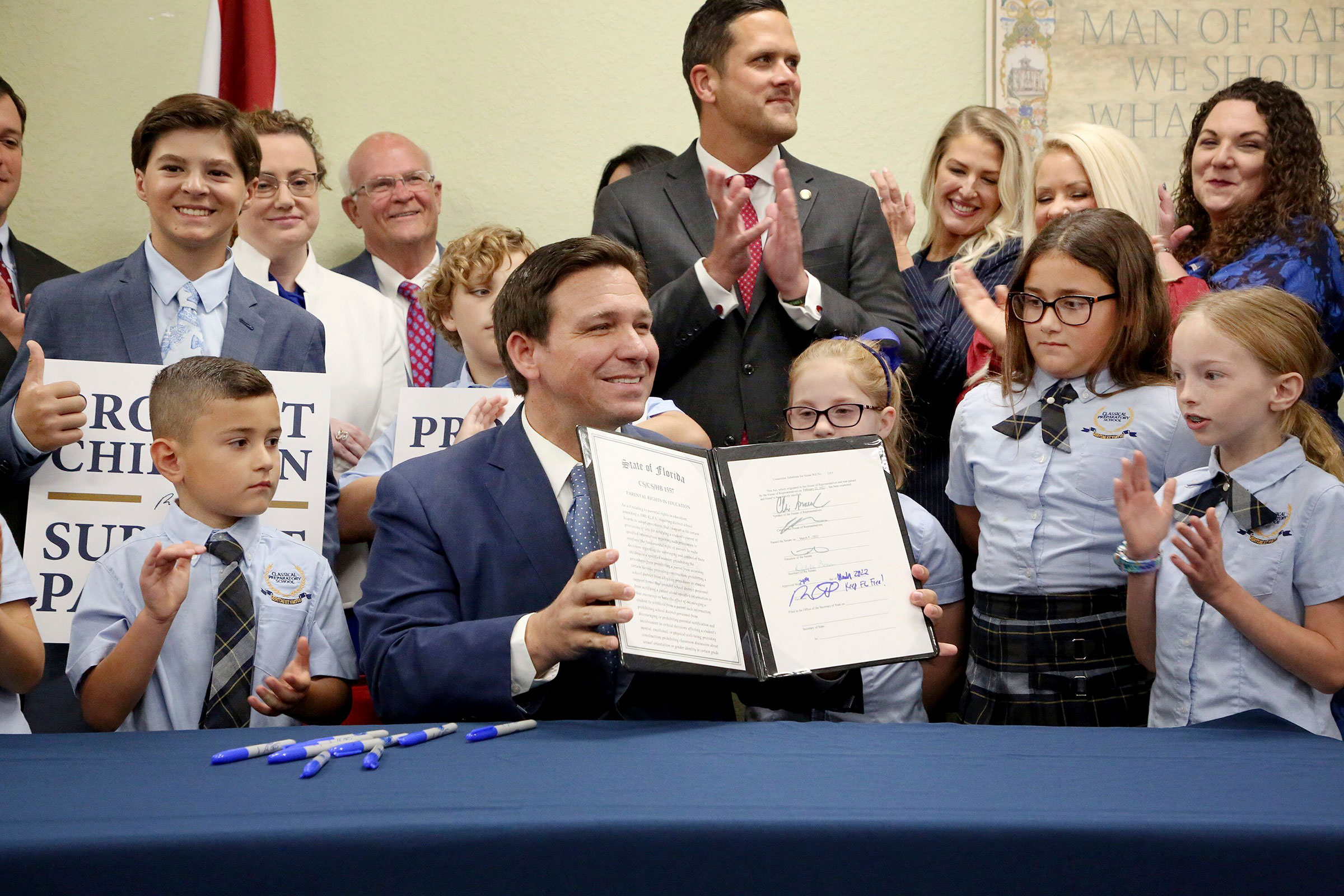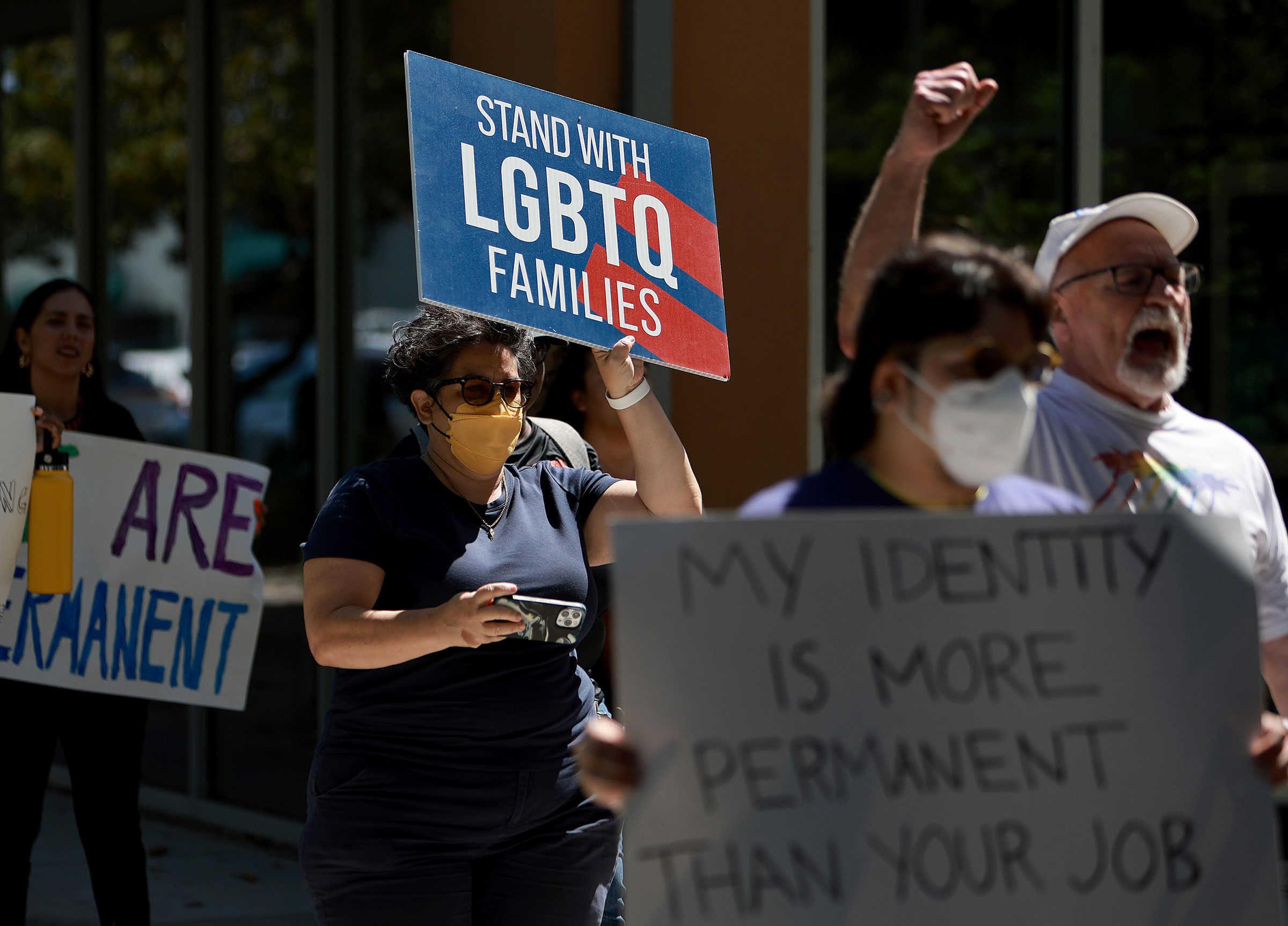
Lourdes Casares and Kimberly Feinberg have been together for over 17 years. After they wed in 2016 when same-sex marriage became legal in Florida, they thought they would be guaranteed all the “rights and privileges” that come with it, Casares says, including having their child be protected and treated equally under the law.
So they have been alarmed, Casares says, to watch the swift advancement of Florida House Bill 1557—called the “Parental Rights in Education Act” by supporters and the “Don’t Say Gay” law by critics—through the Florida legislature. Republican Governor Ron DeSantis signed the bill into law on March 28, and it’s set to go into effect July 1. The new law bars any “classroom instruction” on sexual orientation or gender identity in public school grades kindergarten through third grade—the age range of their child, who attends a public elementary school in Miami-Dade County. (Casares and Feinberg are not revealing the name, age, or gender of their child due to privacy concerns.)
The impact of the new law is hotly debated. Supporters say the law’s intention is to keep parents more involved in the education of their children. But opponents argue it could ban teachers from encouraging the children of same-sex couples from speaking about their families at all, and create an environment in which those children, and LGBTQ students themselves, feel stigmatized and isolated. “It’s billed as a parental rights legislation [but] it’s not for all parents equally,” says Feinberg, 46. “We lose the ability to protect our child, to have [our child] included in the same way as before,” Casares, 53, adds.
Casares and Feinberg are both plaintiffs in a lawsuit filed Thursday morning challenging the law, arguing the legislation violates the Constitution. They are joined by others including two additional same-sex couples with young children, a trans fifth grader, two LGBTQ high school students, a mother of a child who has expressed “no specific” gender identity, and a middle school English teacher. They are represented by the public interest law firm the National Center for Lesbian Rights (NCLR) and the law firm Kaplan Hecker & Fink, and joined by LGBTQ advocacy groups Equality Florida and Family Equality as organizational plaintiffs.

The suit attempts to block the law from taking effect this summer and was filed in federal court against DeSantis; it also names the Florida State Board of Education and its commissioner, and multiple school boards including Miami-Dade County.
“This calculated, politically motivated, virtue-signaling lawsuit is meritless, and we will defend the legality of parents to protect their young children from sexual content in Florida public schools,” Taryn Fenske, communications director for DeSantis’ office, tells TIME.
Miami-Dade County Public Schools says that while the district cannot comment on the litigation, it is “committed to supporting and promoting an inclusive educational environment.” The Board of Education and its commissioner did not respond to TIME’s request for comment.
The lawsuit is the first major legal challenge to Florida’s controversial law. The fate of the legislation could prove a crucial wedge issue for swing voters in the midterms, amid increasing politicization of LGBTQ rights and heightened scrutiny of what children are taught in U.S. schools. And in the meantime, students and parents like Casares and Feinberg—speaking to TIME in their first interview about the lawsuit—are left in limbo as they face an uncertain future about whether their family and identity will be deemed inappropriate for children to learn about in school.
“In some ways,” Casares says, “it feels like we’re moving backwards.”
What the law actually says
The legislation has become a cultural lightning rod in recent weeks; it was mocked at the Oscars, and called “hateful” by President Joe Biden. But the actual meaning of the text of the law has been fiercely debated.
The law’s Section 3 states: “Classroom instruction by school personnel or third parties on sexual orientation or gender identity may not occur in kindergarten through grade 3 or in a manner that is not age-appropriate or developmentally appropriate for students in accordance with state standards.”
State Rep. Joe Harding, a Republican who introduced a version of the bill, told TIME in February that his intention was to keep parents “in the know and involved on what’s going on” with their child’s education. But critics of the law argue that vague wording banning “not age-appropriate” instruction could also extend the ban on LGBTQ topics to even higher grade levels. For younger students, that could mean not teaching books with LGBTQ characters, they claim, and for older students that could mean not teaching students about LGBTQ figures or historical events.
The law also includes the unusual provision of creating a new cause of action for lawsuits, allowing parents to sue school districts if they believe the law has been violated. Supporters say the provision empowers parents, but detractors say it could create a further chilling effect on the speech of teachers and LGBTQ students, given that school districts would have to pay the legal fees if the parents prevail.
Feinberg says that at the start of this school year, students were given a homework assignment of sharing two things they wanted the class to know about them and two things they wanted the teacher to know about them. The first thing her child wrote, Feinberg says, was, “I have two moms.” When Feinberg asked why, her child said they didn’t want the teacher to always say “your mom and dad.”
“[Our child] does not want to be excluded, and knows there’s a potential,” Casares says.
How the lawsuit challenges ‘Don’t Say Gay’
LGBTQ parents and allies in Florida worry that under the new law, children won’t feel as comfortable telling their class about their family or their own identity as Casares and Feinberg’s kid did last year.
Shannon Minter, the legal director of NCLR who represents the plaintiffs in the lawsuit, says he believes the Florida law “threatens to erase decades of progress in terms of making school environments more inclusive and supportive of LGBTQ kids and of kids who have LGBTQ parents.”
The lawsuit challenges the law in several ways. First, it argues that the law and its enforcement mechanism violate the First Amendment by restricting children’s rights to receive information and unduly inhibiting teachers’ speech. Second, it argues that the law was passed for the explicit purpose of disadvantaging LGBTQ people and therefore violates the equal protection clause of the Fourteenth Amendment. Third, the suit argues that the law’s “vague” language will lead to discriminatory enforcement, violating the Fourteenth Amendment’s due process clause.
“This law does not chill speech—instead it returns speech on these topics to the parents,” says Fenske from DeSantis’ office. “The law does not prohibit student-prompted discussion in the classroom. The law does not prohibit teachers from having opinions, lifestyles, or advocacy in their personal right on their own time, and this law does not prohibit teachers from responding to student questions.”
Florida is not the first state to restrict classroom instruction about LGBTQ issues. A handful of states enacted similar restrictions in the 1980s and 1990s, says Clifford Rosky, a law professor at the University of Utah who helped challenge such laws with NCLR. But such restrictions hadn’t been passed in nearly two decades since the major advancements in LGBTQ rights of the 2010s. “Until Florida passed this law, these were really artifacts of a bygone era in which same-sex activity was a crime and same-sex marriage was illegal,” Rosky says. “The logic was that school shouldn’t encourage criminal conduct.”

Florida’s law also fits into a larger wave of restrictions in the past year on what students can and cannot be taught in the classrooms. Conservative politicians in at least 28 states in 2021 introduced bills that would limit discussions of race in classrooms, ten of which became law. At least three states—Arkansas, Montana and Tennessee—have passed bills allowing parents to have their children opt out of lessons that mention sexual orientation or gender identity, according to GLSEN, a nonprofit focused on supporting LGBTQ students. Conservative lawmakers have targeted LGBTQ students in other kinds of legislation as well—at least 12 states have passed laws banning trans students from playing on the sports team of their gender identity, and 19 states have considered bills this year that would criminalize providing gender-affirming care to young people, according to an analysis by the ACLU.
“This is a very dangerous slippery slope we find ourselves on once again,” says Nadine Smith, president of Equality Florida.
The political battle heats up
LGBTQ issues could be a motivating issue for voters in the midterms this fall, and both sides are hoping to use Florida’s law and similar bills to mobilize their bases.
John Feehery, a Republican strategist, argues the Florida law will benefit the GOP at the ballot box. A March 16 Morning Consult/Politico survey found that a slim majority (51%) of U.S. voters supported banning the teaching of sexual orientation and gender identity from kindergarten through third grade. “From a cultural perspective, people are worried about their kids,” Feehery says. “Democrats, when cultural issues dominate, they’re losing.” LGBTQ advocates have accused DeSantis of supporting the ‘Don’t Say Gay’ bill to rally the GOP base ahead of the midterm elections and shore up support for his own possible presidential run.
But Democrats and LGBTQ advocates are starting to organize too. Will Larkins, the president of Winter Park High School’s Queer Student Union in Winter Park, Fla., says that after ‘Don’t Say Gay’ became law, the group’s primary focus became getting out the vote come November. “Vote the people who allowed this to happen—and pushed for this to happen—out of power,” Larkins, 17, says. “What they’re doing does not represent us and does not represent society as a whole.”
The election is still months away, and it can take a long time before litigation reaches a final resolution. In the meantime, Casares and Feinberg talked to their child about the law. They say their kid responded: “I don’t care, I’m going to say gay anyways.”
They’re hoping their lawsuit will make sure their child and other children throughout the state can keep that pride and confidence—and can keep talking about and learning about their families and their own identities in a safe environment with their peers. “[The law] is unnecessary and really has the potential to hurt so, so many people,” Casares says. “I hope this law is obliterated.”
More Must-Reads from TIME
- Inside Elon Musk’s War on Washington
- Meet the 2025 Women of the Year
- The Harsh Truth About Disability Inclusion
- Why Do More Young Adults Have Cancer?
- Colman Domingo Leads With Radical Love
- How to Get Better at Doing Things Alone
- Cecily Strong on Goober the Clown
- Column: The Rise of America’s Broligarchy
Write to Madeleine Carlisle at madeleine.carlisle@time.com